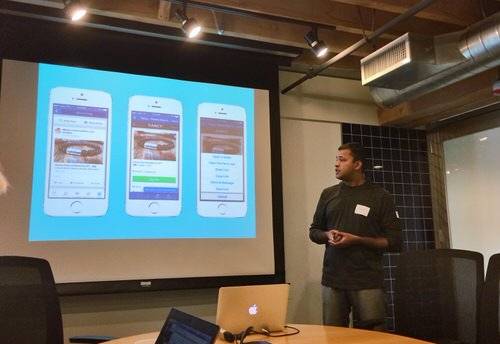It’s still impossible to use mobile applications the same way people use Web browsers. Apps each live in their own silos, and unless they’re produced by the same company—like Foursquare and Swarm—bouncing between them the way we bounce between browser tabs can be challenging.
Facebook has been pushing hard to get mobile-app developers to adopt App Links, its open source software that facilitates deep-links (think URLs that point directly to information inside apps). If it succeeds, links inside apps will no longer take you to mobile Web browsers if another app is a more relevant destination. Mobile advertisers, meanwhile, will get you to navigate directly into their apps.

Over three billion unique URLs are now enabled with App Links, from companies including Pinterest, Airbnb, and Hulu, Facebook product manager Vijay Shankar told reporters at a roundtable discussion in San Francisco on Thursday. The company released App Links in April.
See also: Facebook Takes A Stab At Bridging The Mobile-App Communication Gap
“Hundreds of apps have adopted App Links,” Shankar said. “Once we put the standard out there people are just picking it up because it’s easy and straightforward to use.”
App Links is cross-platform, and takes a short time to implement. Developers enable App Links on HTML pages by publishing tags for Android, and for iOS, publishing the custom URL scheme and the App Store identification. No matter which device you’re using, the link will open up in a mobile application. You can check out the full documentation here.
Because App Links is open source, the company provides reference SDKs so developers can implement deep-linking without ever talking to Facebook.
Now, With Analytics
To let developers find out how their App Links URLs are performing, Facebook announced analytics support to track and monitor links.
“We have met with a lot of developers who have adopted App Links already, and the most requested feature was, ‘Help me understand the value of my App Links integration,’” Shankar said.
Facebook, Parse and Mixpanel have enabled analytics solutions already, but developers who don’t use any of these services can use the open sourced information provided on the App Links website to build their own, or work with any other analytics provider.
The Obstacles, Starting With Google And Apple
To get one app to link to another using App Links, the user needs to have both apps downloaded, and the apps are required to have App Links enabled.
Pinterest and Facebook both support App Links—so if your friend shares a pin via Facebook, you can tap on the link and view it in your Pinterest app. But if you try and view the same pin via Twitter, which doesn’t yet support App Links, it will open in the mobile Web browser instead.
Getting mobile applications to talk to one another is a laudable goal. It can be frustrating to re-enter login information when people jump from an application to the mobile Web. Though App Links, while helpful for many developers, is not yet a solution.
Google doesn’t support App Links. Neither does Apple. So apps that enable only App Links for deep-linking aren’t directly accessible from Google search or iMessage—or any other Google or Apple service.
Google already provides app indexing, or deep-linking, for Android applications. Any Android apps that have that have the package installed can be deep-linked in Google Search, meaning users can click on a search result in the mobile browser, and get pushed into an app they have downloaded.
Android developers who want people to access their apps directly from both Google and Facebook will have to use both app indexing and App Links.
Apple’s operating system, for its part, is still relatively closed off, but updates in the upcoming iOS 8 are expected to loosen sandbox restrictions and make it easier for apps to talk to each other. This could mean that Apple, like Google, will provide its own deep-linking solution.
What’s In It For Facebook
Think about the last time an application pushed you into a mobile Web browser and forced you to enter your login information before taking any action. Did you complete the transaction?
If you’re like me, you probably didn’t. More often than not, I wait until I’m in front of a computer to visit a website that was operating too slow on my mobile device. Even if I have an app installed, I probably won’t search for the specific page I’m looking for, because that takes up too much time. I want things to be easy.
Ideally, instead of getting pushed into a Web browser, App Links enables people to jump directly into an application they’re already logged into. If it’s an e-commerce application, it stores their credit card information, and people can purchase an item in two taps.
App Links is supposed to make the mobile app experience smoother—just like jumping from tab to tab on a Web browser.
Facebook released App Links as open source software, so it has no way of knowing what companies are using it, and it isn’t making money directly from the technology. But Facebook’s benefit, and developers’ benefit, are quite similar.
Advertising.
Facebook app-download ads are among the social network’s most successful product. So ads that drive users directly into mobile apps they’ve already installed is a natural next step.
A month ago, Facebook updated its APIs to get App Links to work in the Facebook ad system, Shankar said. So developers who want to drive more people to download and use their apps can use App Links, plus Facebook ads, to do so.
App Links isn’t going to change the way we interact with our apps, at least anytime soon. But it’s a great first step to get mobile apps really talking to one another for the first time since the release of the App Store six years ago.
Lead image of Facebook product manager Vijay Shankar by Selena Larson for ReadWrite

















